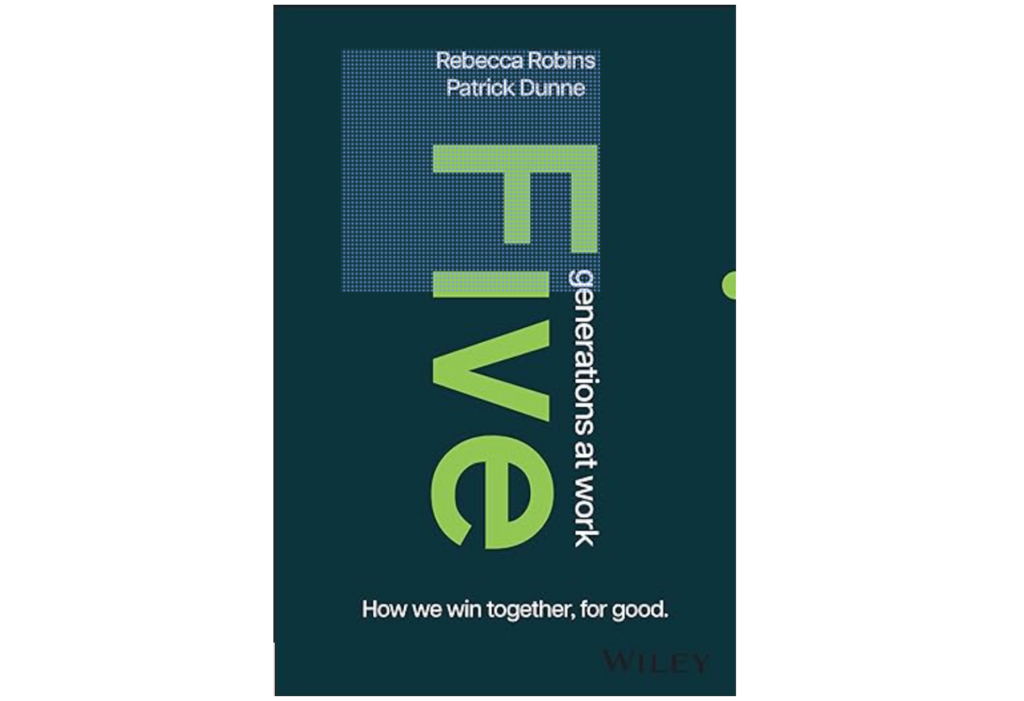Five generations at work – yes, now!
25 September 2024 By Victoria Tomlinson

Five generations – Exciting? Nightmare? Impossible? Opportunity?
I have realised all the discussions on this topic are about the challenges, the tensions. I have not heard one person express excitement. Until now.
Patrick Dunne and Rebecca Robins have spent six years researching what should be the new norm of five (or six or seven) generations working in one workplace. I love that they recognise the challenges but focus on the businesses and organisations that are flying because of the strengths of ALL their workforce.
They talk about diversity at work bringing innovation. Of course. But diversity recently has become about ‘women’, ‘race’, ‘sexual orientation’. Diversity of age is still rare – both for boards and for workforce strategy.
Listening to Patrick and Rebecca I realised how rare it is to hear businesses be enthusiastic about older generations! And I also realised, I may have fallen into the trap of championing the 50+ generations without bringing out that excitement and future possibilities.

So now let’s put that right.
The book Five Generations at Work: How we Win Together, For Good
Their book, Five Generations at Work: How we Win Together, For Good, comes out this week – I have pre-ordered. I was listening to a podcast with Alberto Lidji, Do One Better, who was very much playing devil’s advocate. He referenced Pol Polman (former visionary CEO of Unilever) who – he thought – had talked about the need not just to include young people in the future of business, but maybe ‘hand it over to them’?
Patrick replied, “This is where we go wrong. It’s not one or the other. It’s all of us together.”
If ever there was a time to make this work, it is now when skills shortages are killing businesses.
Rebecca talked about the golden rules of three. In this case what were the characteristics of the most successful intergenerational businesses – and organisations? Why are they successful?
“First, it’s about leadership, a mindset. Not just ticking a few boxes but systemic, sustainable change. Recognising this is a once in a lifetime opportunity – a time of renaissance. We cannot keep doing what we have always done, but need a whole rethink.”
She went on to the second point – collaboration. “It’s not about doing TO people, but WITH them. It’s all of us, the combined strength of everyone,” she added.
And the third point is innovation. Generations working together are more innovative. It makes sense, doesn’t it? Those who have grown up with technology and can see tech possibilities on every corner. Along with people who have been there and done it and able to think, what about….? Maybe we could consider.
But also, as Patrick says, don’t stereotype generations. He quotes an 80-year-old ‘dancing around a kitchen’ full of new ideas every day.
The book is apparently full of case studies, and I can’t wait to read these. Patrick mentioned Hoffman-La Roche, the Swiss multinational healthcare group. He and Rebecca had been discussing NextGen boards where companies are starting to build the capability of future boards and bringing in younger people to do this. Patrick went on, “When we talk about NextGen boards that isn’t just bringing the next generation onto a board, but getting the board to look at the long term future for that organisation. He then quoted Hoffman La Roche, a family business, which is looking at the shape of the next 100 years. They see this as being good ancestors.
I love this though confess I sometimes struggle to see the next decade with the pace of change, but actually in some ways it’s easier to imagine the big picture of a century ahead than the next few years which probably needs more immediate detail. It’s a trick futurists use – in your mind jump forward 20 or 30 years and imagine the world of your grandchildren. You instinctively know some things will be the same – the need to eat, drink and sleep – but you can guess that the way food is packaged, bought and delivered might look different. Or will they? I remember doing this 30 years ago and thinking home delivery of milk bottles will be gone – but quaintly we still have a milkman!
Why embrace intergenerational working
Over the last year, I have been banging the drum for the 50+ generation at work. In the UK, there are 1m people of this age who want to work and can’t get jobs, despite skills shortages. I am regularly challenged that we need to help young people and older people haven’t changed enough and are a burden for employers and more. The bit about being a burden is a whole other story – that’s largely because employers have not invested and trained them over the last few decades.
Coming back to the now. Again, this must not be one or the other. We have skills shortages so we should not be choosing between generations but finding ways to recruit and work with all this talent. And what this research shows is that if you do this, you will be more successful – however you measure success. Embracing intergenerational working means you will be more innovative and better future proofed.
I love the passion and enthusiasm that sings through all this – they are people of my tribe! Rebecca finishes by saying the successful businesses of the future are the ones who will be able to grasp the enormous opportunities of our time. Do things differently and exercise muscle in collaboration between generations – not tokenistic nods.
We are so lucky. We are living through one of the most extraordinary times of opportunity of our lifetime. CPOs and HR directors – are you ready to grasp this chance and be one of the winners? Make the most of all our generations and innovate and succeed?


